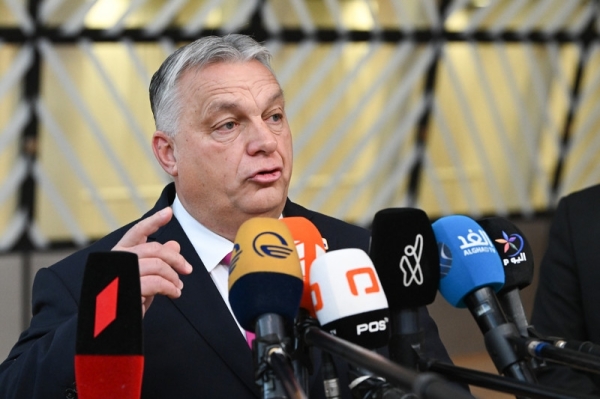EU reaches rapid deal on Ukraine aid after Orbán folds
After weeks of uncertainty and pre-emptive recriminations, EU leaders on Thursday (1 February) rapidly agreed to deliver on their €50bn four-year economic aid package to Ukraine, which had been initially unilaterally opposed by Hungarian prime minister Viktor Orbán.
The European Commission is now expected to prepare an annual report on the implementation of the aid, the so-called Ukraine Facility, which will be followed by discussions at the level of EU leaders.
If needed, the European Council would invite the commission to propose a review in the context of the next EU long-term budget, according to new conclusions.
Giving in to Orban’s concessions — which were deemed a ‘no-go’ and ‘red line’ by almost all other EU states — risked that the Hungarian pattern of obstruction would continue, said Estonian prime minister Kaja Kallas ahead of the discussion.
And there have also been discussions about "how to break this pattern," she said.
Kallas also emphasised that Orbán is always looking to be "the centre of attention" when there is a European Council in Brussels. "It shouldn’t be like this."
Orbán is "misusing" the unanimity principle and we should defend it, Lithuania’s Gitanas Nausėda had also said, prior to the meeting and rapid agreement.
Thursday’s extraordinary council was convened after Orbán blocked all compromises in December.
Hungary, known for its close ties to Moscow, back then also blocked opening accession talks with Ukraine — but an improvised solution was found when German chancellor Olaf Scholz asked Orbán to leave the room so that the other 26 countries could legally agree on continuing the enlargement process.
With an agreement preferable at full EU-27 level, Orbán since then has been more and more isolated.
There is not "Ukraine fatigue" but "Orbán fatigue," Polish prime minister Donald Tusk said pointedly ahead of the summit, describing Orbán’s attitude as a "strange and egoistic game".
Despite widespread anticipation that Orbán would maintain his veto on Thursday and thus leaders would need to look for alternative solutions at an EU-26 level, a deal was announced by EU Council president Charles Michel on X (formerly Twitter) just 15 minutes after talks with the 27 leaders were launched.
While this could have been agreed on a technical level weeks before, EU officials argue that Orbán wanted a discussion with EU leaders to bring back to the table the question of whether Europe has the right policy approach for Ukraine
Pre-meeting meeting
Before the summit started, Michel, Italian prime minister Georgia Meloni, EU Commission president Ursula von der Leyen, , French president Emmanuel Macron, and German chancellor Olaf Scholz had a sit-down meeting with Orbán.
Afterwards, Orbán left the room and Poland’s Tusk, Spanish premier Pedro Sánchez, Dutch prime minster Mark Rutte and the leaders of the Baltic countries enter to check if there was a compromise.
Budapest’s blockage at the technical level for weeks has been fuelling frustration and irritation against Orbán in Brussels and EU capitals, prompting a possible plan to sabotage Hungary’s economy and talks about using the Article 7 punishment procedure to strip Hungary’s voting rights.
However, this has never been the preferred option, as EU countries have been historically reticent about using the procedure in case of potential repercussions and retaliation.
Rutte said there were many reasons for Orbán himself to agree on the €50bn financial aid to Ukraine.
But Estonia’s Kallas was even clearer. "If you look at the economy of Hungary... the interest rate of their central bank is nine percent. That shows how well his economy is doing."
"Hungary needs Europe, so he [Orbán] should also look into what is in it for Hungary, being in Europe," she said.
Belgium, which currently holds the EU Council presidency, has been holding interinstitutional negotiations with the EU parliament on the Ukraine Facility — with the aim to finalise the text as soon as possible.
This is a developing story

